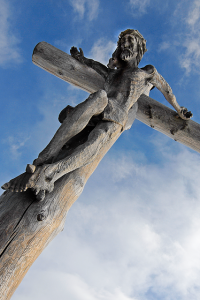Understanding submission…
The prophetic witness of Christians before the State has too often been muted by a surface reading of the Apostle Paul’s words in Romans 13:1-7, with its infamous “Every person is to be in subjection to the governing authorities. For there is no authority except from God, and those which exist are established by God” (Rom. 13:1).
Added to this are Peter’s words: ”Submit yourselves for the Lord’s sake to every human institution, whether to a king as the one in authority, or to governors as sent by him for the punishment of evildoers and the praise of those who do right” (1 Pet. 2:13-14).
It is critical that we read these verses about submission in their larger contexts and in the light of Jesus’ and the Apostles’ missionary activity and teaching. When you also deliberately engage with other Scriptures about governing authorities, like Psalm 2 and Revelation 13, a uniquely revolutionary form of resistance emerges that can inform our action in these challenging times.
What is often missed is that Paul and Peter called followers of Jesus to submit to the pagan and brutal Roman Empire. That submission included respecting the rule of law as long as it didn’t counter the higher allegiance to Christ, honoring those in authority, and humbly accepting the consequences if disobedience was required. Jesus, Peter and Paul were all arrested, beaten, and imprisoned for their missional activities, and Paul wrote at least four of his Epistles from prison.
Yet Paul still viewed all categories of rulers and authorities governing the world as part of the originally good creation, made by Christ:
“For by him all things were created, both in the heavens and on earth, visible and invisible, whether thrones or dominions or rulers or authorities — all things have been created through him and for him” (Col. 1:16).
These non-human entities were viewed as subsequently fallen and rebellious, as the beast which Revelation 13 graphically portrays–but still in operation until the end.
Submission for a Fragile Community
So Paul and Peter are calling for Christians to be in a kind of subjection to whatever government or political party is in power in these times towards the end of history—whether that be a democracy, a caliphate, a fascist dictatorship, a monarchy or maybe even a mafia or gang network that rules a failed state.
Paul and Peter were recommending a course of action so that fragile new faith communities could survive and advance in hostile terrain, while simultaneously bearing witness to Jesus. “If possible, so far as it depends on you, be at peace with all people” (Rom. 12:18). Their counsel is in part like advice given to prisoners serving a prison sentence, or to people on probation or engaged in drug court who must obey the rules to avoid further trouble.
Their call must not be read as a religious leaders’ endorsement, a statement suggesting State actions reflect God’s will or as suggesting a cozy alliance between religious and secular leaders.
Jesus, Paul, and Peter called for allegiance to God as highest power: “You shall love the Lord your God with all your heart, and with all your soul, and with all your strength, and with all your mind, and your neighbor as yourself” (Lk 10:27).
Nor do these texts mean that Christians must obey laws that go against conscience, be silent about injustice or hold back from their highest callings as Jesus’ disciples.
Jesus resisted authorities when he healed on the Sabbath, cleansed the Temple, and strongly critiqued religious leaders. Peter and Paul went right on preaching when told not to, and willingly suffered the consequences. The first Christians refused military service and worship of Caesar as Lord and suffered torture, imprisonment, and execution.
Paul appears to have often considered governing authorities his enemies, writing strong words regarding enemy love right before Romans 13: “Bless those who persecute you; bless and do not curse” and end with “do not be overcome by evil, but overcome evil with good.” (Rom. 12:14, 21).
Jesus’ revolutionary submission
 Jesus models a quiet authority and confidence before the Roman governor of Judea Pontius Pilate, after he informed him he had authority to release him or crucify him with: “You would have no authority over me, unless it had been given you from above” (Jn. 19:11)—ultimately from himself!
Jesus models a quiet authority and confidence before the Roman governor of Judea Pontius Pilate, after he informed him he had authority to release him or crucify him with: “You would have no authority over me, unless it had been given you from above” (Jn. 19:11)—ultimately from himself!
The Apostles saw Jesus’ subjecting himself in self-giving love on the cross as the deathblow to the ruler of this world– the beginning of the end of the reign of the rulers and authorities, which will be judged and finally destroyed (1 Cor. 15:24-27).
Romans 13 and 1 Peter 2 must be read in the light of Psalm 2, which begins by asking a question that Christians in America and in many other nations should be asking: “Why are the nations in an uproar and the peoples imaging a vain thing?”
“Why do we as Christians get so caught up in endorsing political candidates and parties, mirroring the hate-filled political divisions around us?”
My sense it that many Christians are not adequately informed about the final destiny of the powers and our own unique prophetic vocation.
 The Psalmist reminds us of the macro divine perspective: “The kings of the earth take their stand and the rulers take counsel together against the Lord and against his anointed” (Ps 2:2).
The Psalmist reminds us of the macro divine perspective: “The kings of the earth take their stand and the rulers take counsel together against the Lord and against his anointed” (Ps 2:2).
Jesus experienced hostility from rulers and authorities, and prophesied his followers would experience the same (Mk. 13:9; Lk. 12:11)– which they did (Acts 4:5). Martyrdom was normative then and is on the rise now.
Christians are called to be subject to governing authorities not because they are good or represent God’s agenda. Our citizenship is in heaven. Peter urged believers to see themselves as “aliens and foreigners” right before his words about being subject to authorities, who he sought to evangelize:
“Keep your behaviour excellent among the Gentiles, so that in the thing in which they slander you as evildoers, they may because of your good deeds, as they observe them, glorify God in the day of visitation” (1 Pet. 2:11-12).
Christian submission to rulers and authorities must be done from a perspective of open-eyed realism about both the rebellious, hostile orientation of the powers against the reign of God and Jesus’ greater sovereignty and victory.
“He who sits in the heavens laughs, the Lord scoffs at them. Then he will speak to them in his anger and terrify them in his fury, saying, “But as for me, I have installed my King upon Zion, my holy mountain” (Ps. 2:4-6).
Jesus is that King, the Son of the Father, come to open the way for us to receive our authority and receive our inheritance as daughters and sons.
“I will surely tell of the decree of the Lord: He said to me, ‘You are my Son, today I have begotten you. ‘Ask of me, and I will surely give the nations as your inheritance, and the very ends of the earth as your possession” (Ps. 2:4-8).
Jesus was installed “King of the Jews” there on the cross. Jesus’ submission to rulers and authorities to the point of death on the cross was God’s secret weapon against Satan and the rebellious powers. God “disarmed the rulers and authorities, he made a public display of them, having triumphed over them through him [Jesus]” (Col 2:15).
The Psalmist’s prophetic warning is still in force, putting all Christian submission and resistance into the larger context of Christ’s victory and destruction of the non-human powers.
‘You shall break them with a rod of iron, you shall shatter them like earthenware.’” Now therefore, O kings, show discernment; Take warning, O judges of the earth. Worship the Lord with reverence and rejoice with trembling. Do homage to the Son, that he not become angry, and you perish in the way, for his wrath may soon be kindled. How blessed are all who take refuge in Him!
Psalm 2 brings hope to Christians subjecting themselves to unjust rulers as we know Jesus’ submission wins as all authorities will themselves finally submit to Jesus Christ as King. May we learn from the suffering Christ to step into long-suffering prophetic witness now.


